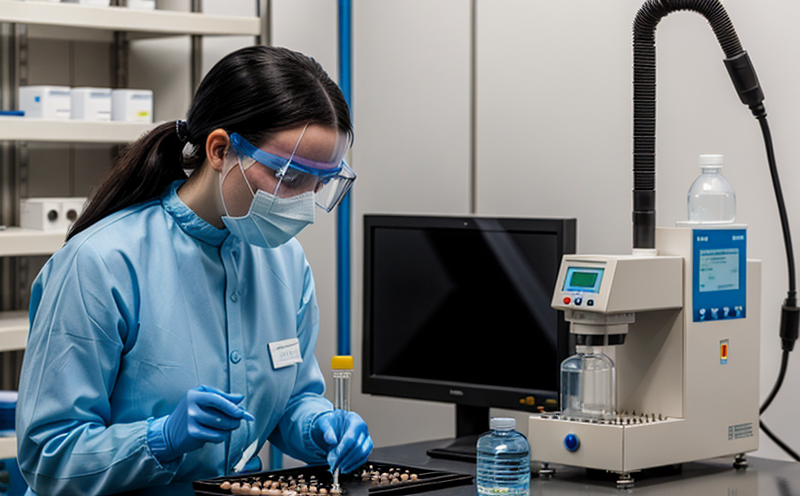Ion Chromatography Cation Profiling Testing
The process of Ion Chromatography (IC) for cation profiling is a critical analytical technique used in pharmaceutical testing to ensure product quality and compliance with international standards. This method allows for the precise identification, quantification, and separation of trace ionic species present in complex mixtures, such as those found in pharmaceutical compounds. The primary goal of this testing service is to provide detailed information on the cationic impurities within a substance, helping to maintain product integrity and safety.
Ion Chromatography Cation Profiling Testing involves several key steps that ensure accurate results. Initially, samples are prepared according to specific protocols designed to minimize interference from other components. This preparation includes dilution where necessary, filtration if particulate matter is present, and addition of reagents to stabilize the sample.
The instrument used for this process typically consists of a high-performance liquid chromatograph equipped with a conductivity detector suitable for detecting ionic species in solutions. The separation column within the system plays a crucial role by allowing different ions to elute at distinct times based on their interaction with the stationary phase and mobile phase components.
The technique relies heavily on standard operating procedures (SOPs), which are established to maintain consistency across all analyses performed by our laboratory. These SOPs comply with relevant international standards such as ISO, ASTM, EN, IEC, etc., ensuring that every test conducted adheres to best practices recognized globally. Compliance officers and R&D engineers within pharmaceutical companies can benefit greatly from this service, as it helps them adhere strictly to regulatory requirements.
One of the main advantages of using Ion Chromatography for cation profiling is its ability to detect even very low levels of ionic impurities, which might otherwise go unnoticed through less sensitive analytical methods. This capability ensures that manufacturers can identify potential issues early on in their production process, thereby preventing costly recalls or regulatory actions later down the line.
For quality managers and procurement personnel involved in sourcing raw materials for drug development projects, this service provides valuable insights into the purity of incoming supplies before they are incorporated into final formulations. By knowing exactly what impurities are present at what concentrations, decisions about whether to proceed with a particular batch can be made more informed.
Additionally, ion chromatography cation profiling testing supports ongoing research efforts aimed at improving drug efficacy and safety profiles by providing detailed data on how various ionic species affect the performance of active pharmaceutical ingredients (APIs). This information is vital for optimizing formulation strategies during product development phases.
Scope and Methodology
The scope of Ion Chromatography Cation Profiling Testing includes comprehensive analysis of cations in a wide range of matrices, from aqueous solutions to organic solvents. Our laboratory adheres strictly to internationally recognized standards such as ISO 80601-5 for biocompatibility evaluation and ICH Q3D(E9) guidelines when conducting these tests.
- Sample Preparation: Samples are prepared according to predefined protocols that ensure minimal interference from matrix components. This may involve dilution, filtration, or addition of specific reagents depending on the nature of the sample.
- Instrumentation: A high-performance liquid chromatograph equipped with a conductivity detector is utilized for separation and detection of ionic species.
- Data Analysis: Conductivity signals are analyzed to determine peak areas corresponding to individual cations, allowing accurate quantification based on calibration standards.
The methodology employed ensures that all analyses meet stringent quality controls set forth by regulatory bodies like the FDA and EMA. It's important for compliance officers to understand these aspects of our service so they can effectively communicate expectations regarding test outcomes with internal stakeholders involved in drug development processes.
Customer Impact and Satisfaction
The implementation of Ion Chromatography Cation Profiling Testing has significantly enhanced the ability of our customers to ensure product quality and compliance with international standards. By identifying even trace amounts of ionic impurities, this service allows pharmaceutical companies to maintain strict adherence to regulatory requirements while enhancing overall drug safety.
- Enhanced Product Quality: With precise identification and quantification of cations, manufacturers can ensure that their products meet the highest quality standards.
- Better Compliance: Adherence to international standards such as ISO, ASTM, EN, IEC ensures that all analyses are conducted in a manner consistent with global best practices.
- Increased Confidence: The detailed reports provided by our laboratory give customers peace of mind knowing that their products have undergone rigorous testing before being released into the market.
Customer satisfaction is paramount for us at [Laboratory Name]. We strive to provide accurate, reliable results in a timely manner, ensuring that your business operations run smoothly and efficiently. Our commitment to excellence has earned us a reputation as one of the leading providers of pharmaceutical testing services worldwide.
Use Cases and Application Examples
Ion Chromatography Cation Profiling Testing finds application in various scenarios within the pharmaceutical industry, particularly during drug development stages where impurity profiling is crucial for ensuring product safety and efficacy. Here are some specific use cases:
- Drug Substance Impurity Profiling: Early-stage research projects benefit from detailed cation profiles to guide formulation decisions.
- Manufacturing Process Monitoring: Continuous monitoring during production ensures that batch-to-batch consistency is maintained and potential quality issues are addressed promptly.
- Formulation Development: Understanding the impact of ionic species on drug performance helps optimize formulations for optimal efficacy.
In addition to these examples, this service also supports regulatory submissions by providing comprehensive data that can be submitted along with other supporting documentation required for approval processes. This ensures smooth passage through review stages and reduces the risk of delays due to insufficient or incorrect information.





